Gen Z – a demographic cohort succeeding Millennials and preceding Generation Alpha, has unique skills and perspectives. Also known as Zoomers, they are generally born between 1997 – 2012. Gen Z can bring fresh ideas to the table and help businesses grow and succeed. However, shocking statistics from Gallup reveal only 46 percent are engaged, a little lower than other generations.
So, how can managers and leaders ensure Gen Z employees stay connected to their organization?
That is where the role of an employee engagement strategy comes in! With an effective Gen Z employee engagement survey questionnaire and the right process to collect feedback, you can unlock their potential and ensure that they remain engaged throughout their employment.
Knowing Gen Z and what matters to them
Gen Z are steadily increasing their influence in the workplace. This outspoken generation is leading the charge of growing workplace activism. During the great resignation, and until today, many of these young workers thought of quitting their jobs. They are not shy about being vocal about their needs and tend to leave if they aren't met.
So, what motivates Gen Z in the workplace? We have listed down a few things that matter the most to them.
1. Well-being
As per Deloitte's 2022 Gen Z and Millennial survey, 46% of Gen Z employees feel burned out due to the intensity/demands of their working environments. And this is why a lot of them left their employers.
For this generation, personal mental well-being is a top priority, and they aren't willing to trade present sacrifice for future promises. Long gone is the extra work hustle to stand out.
2. Purpose or meaning in work
A key reason that drives the Gen Z exodus is the lack of purpose or meaning in their work. 42% choose to work at a company that gives them a sense of purpose over one that offers a higher paycheck.
They are passionate about making a difference. And good things happen if their goal is aligned with their company's. They're loyal, engaged, and proud of their company—all signs of a great workplace.
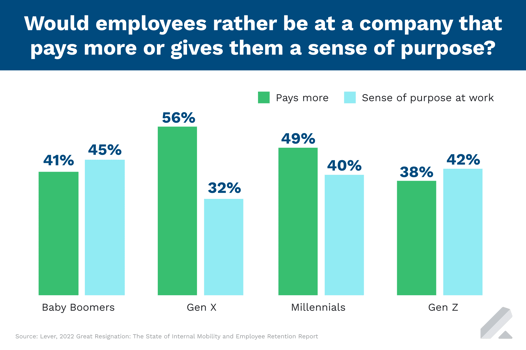
Source: Lever
3. Greater flexibility and resources
While salary is the most critical factor in deciding on a job, Gen Z employees value salary less than every other generation, and put higher emphasis on their personal and professional life equally. They eagerly await chances to provide their best work while maintaining their freedom. Perhaps companies are now understanding this and prioritizing remote and hybrid working arrangements.
4. Gen Z values diversity
A majority of this generation (67%) has witnessed or experienced discrimination. Additionally, 44% report having experienced such discrimination. The need for diversity, equity, and inclusion is rising in the workplace. And Gen Z prioritizes these concerns above all others.
83% of Gen Z candidates said that a company's commitment to workforce diversity is essential when choosing an employer. Gen Z expect that their workplaces reflect not only their values but also promote diversity among their peers.
5. Doesn't like to be micromanaged
While Gen Z employees appreciate personal feedback and guidance, they don't like to be micromanaged. They expect to have proactive communication, solid connections, and complete transparency in their place of work.
When micromanaged, they become uninterested in your company and seek to leave. This is why many companies have started using cutting-edge HR tools to give employees more control over their schedules.
Why is it crucial to optimize the workplace experience for Gen Z?
A lot of factors have shaped this generation’s thinking, including privacy, technology, and gender issues. Leaders also need to recognize that it is entirely normal for Gen Z employees to have different demands than their Baby Boomer, Gen X, or even millennial peers.
Surprisingly, many employers are still unsure how to manage and motivate this new demographic in the workforce. A lot of organizations are using a blanket approach to attract talent. Gen Z are different from older generations, and organizations should not expect them to behave the same way.
"Gen Z isn't the majority yet, but they will be."
Jenn Lim - CEO & Co-founder, Delivering Happiness
Furthermore, according to a Forbes report, Gen Z employees will comprise 27% of the workforce by 2025. And most of them are naturally digitally literate, passionate, and extremely creative. If organizations and teams consist of such young minds, it is evident that they would want to retain them.
Another thing to keep in mind is that most Gen Z employees do not consider job-hopping to be taboo. This is why it's more important that a company be as appealing and relevant as possible to this demographic so they can be sustainable in the long run.
Besides, they are keen on exploring multiple positions, careers, and industries. Employee attrition is not only a costly affair for organizations but also adversely affects a brand's reputation.
Evidently, optimizing the workplace experience for Gen Z plays a critical factor in retention, engagement, and productivity!
So instead of just throwing money at the problem, savvy managers should consider optimizing employee experience (EX) by tapping into their unique generational needs.
How do you engage Gen Z in the workplace?
Since Gen Z is equipped with high standards, leaders may run into some problems with Gen Z in the workplace. However, they also bring special abilities and skills that enliven the corporate environment. The secret to engaging and enhancing the Gen Z experience is understanding what makes them tick.
1. Cultivate a nurturing environment
Employers should cultivate a nurturing approach that ensures the iGeneration workforce has a positive experience. You should also give them the room to branch out to do their jobs in a way they feel is right. When it comes to managing Gen Z, hovering and micromanaging only results in increased stress.
Fostering a nurturing environment also includes offering encouragement and appreciation for their work. While this is essential for all generations, it becomes even more important when dealing with younger generations.
2. Provide feedback
In the United States, 92% of employees seek feedback on their work performance more regularly than annually. Every generation wants to be heard, but for Gen Z – a more vocal generation – it has even greater significance. They want their managers to care, listen to their concerns, and seek regular feedback on their performance.
When they feel that their managers don't care – or are disingenuous about their career and future opportunities, they may begin to shut down and grow bitter.
Weekly catch-ups with managers are especially important to engage Gen Z employees. Managers should genuinely ask about their experience, extend their support, and provide feedback when necessary.
3. Offer flexible work setting
Gen Z has had technology at their fingertips since birth and does not know a world without it. They are naturally digital natives and enjoy having things done conveniently. It is understandable why "Workation" has emerged as one of the newest workplace trends.
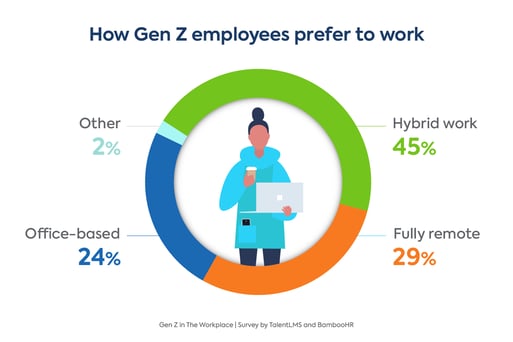
Source: TalentLMS
Gen Z are also known to have increased their work output by working beyond the constraints of the conventional workplace. If given an opportunity to operate in a flexible environment, they will feel freer, which will further increase engagement.
4. Foster learning and development
Gen Z employees desire a job that suits their need to develop and grow. They are ambitious and always on the lookout for advancement in their careers.
37% of Gen Z believe that the most notable workplace shift within the next 10 years will be AI and other technologies to automate many jobs or functions fully. And more than 76% seek to look for opportunities to learn new skills.
Organizations can easily motivate this generation if they provide a pathway to career development.
5. Promote easier collaboration
When it comes to the work environment, research suggests that 72% of Gen Z employees prefer in-person communication.
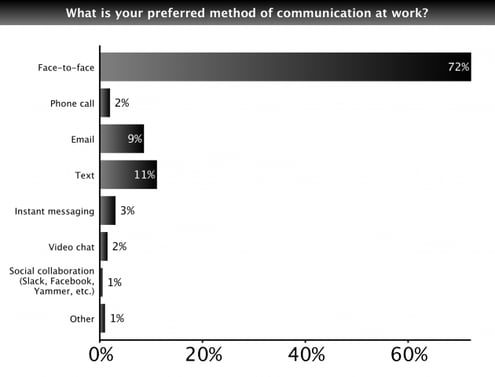
Source: Inc.com
The lack of frequent communication with managers may cause them to believe something is wrong. This can have a detrimental effect on their productivity. Leaders can leverage the expertise of experienced employees to help mentor Gen Z. This will foster better collaboration and bridge the gap between all age groups.
What to ask in the Gen Z employee engagement survey questionnaire
To put it bluntly, the answer is: it depends.
What you expect to achieve, the characteristics of your workforce and the problems you wish to diagnose are all factors that determine the kind of questions you should be asking.
To give you a point of reference, here are the top 5 questions that organizations ask their employees in our BELONG employee engagement platform.
The questions should be presented as statements where employees can rate their experience on a scale of Strongly Agree - Strongly Disagree:
-
How likely are you to recommend this organization as a place to work to friends or family?
*This question is the most important one as it measures eNPS - the overall employee engagement level -
My professional development and growth is encouraged at work.
-
My direct manager provides clear and regular feedback on how well I do my work.
-
My organization's mission or purpose makes me feel that my job is important.
-
Even if offered a comparable role and compensation package at another company, I would choose to stay at this company.
There are many more questions that you can - and should - ask your Gen Z and all employees. What's equally important is also how you're asking the questions.
Asking the right questions once won't have as much impact as opposed to doing it consistently, without making employees feel fatigued.
This is why it's important to practice continuous listening when it comes to collecting employee feedback.
Continuous listening to better manage the Gen Z employee experience
At this point, it is suitable to say that engagement surveys are the ideal way to gauge EX levels and take adequate steps to improve employee engagement. However, how do you ensure you garner an excellent supply of feedback from younger audiences?
Or even so, how to get Gen Z to answer employee surveys?
If you're looking for a Gen Z employee engagement survey questionnaire, you first need to consider these tips to ensure you get the feedback you're looking for. These tips also apply to conducting pulse and engagement surveys for the workforce as well.
-
Set up a feedback collection program (e.g.: pulse or engagement survey) - Set up your pulse or engagement survey. Short questionnaires are more likely to generate higher participation. Ask for participation from ALL employees - and not just limit it to one group. This way, you will have a point of reference to compare the results between groups later on.
-
Enable multi-device participation - Roll out e-surveys because not only are they more efficient, but they also ensure higher participation rates due to ease of access.
-
Set up and send reminders for participation - To increase participation, send reminders over a period of time. Remember, while reminders are necessary, optimizing them effectively—without overdoing them — is a complicated art. Make sure you have an automated system in place so reminders are not sent to those who have given their feedback
-
Analyze results - Analyzing the results helps you notice patterns, challenges, and problems. You can compare the results between cohorts (i.e., Gen Z vs. Millennials vs. Gen X) to understand the different behaviors and needs of each.
-
Plan ahead - Actionable insights from the surveys help you plan for concrete actions to be taken to improve engagement for Gen Z and other age groups. Tailor your strategy, focusing on areas that need improvement for each age group.
Although collecting feedback may seem like a simple task, many HR practitioners and leaders face hurdles as they start to do it without the right tools.
Knowing the right questions to ask, setting up a confidential survey, getting participation, and analyzing results are all heavy tasks to take on.
This highlights the importance of having the right tool to collect feedback. It ensures all the process is seamless and reduces the amount of load for the team setting up the survey.
And a tool like EngageRocket is designed especially to help organizations tackle this issue.
How does EngageRocket help you to collect feedback and engage Gen Z?
Improving employee experience amongst different generations of workers allows employers to bring in diverse viewpoints and build a sustainable talent pipeline.
EngageRocket's BELONG platform helps leaders and managers gain a more holistic view of engagement levels across different employee groups - by age group, generation, team, function, and many more.
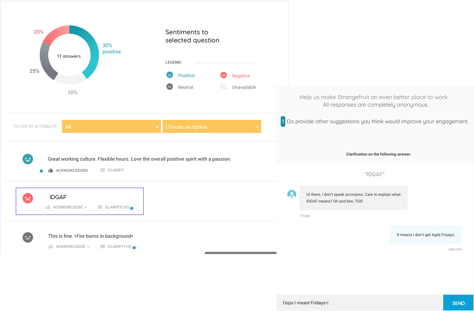
More specifically, EngageRocket's BELONG helps organizations to:
Quickly to set up, customize, and launch a feedback collection program
BELONG is equipped with a scientifically validated question library so you don't have to come up with questions from scratch
Collect feedback with confidentiality
BELONG is designed so everyone can feel safe voicing out their opinions without the risk of witch-hunting.
Get high participation rates through multi-device surveys
Employees can freely choose to fill up the surveys through any device they have
Analyze results and gain insights instantly
The intuitive dashboard in BELONG makes it easier to compare drivers of engagement by gender, age group, seniority, and others. This helps you identify risk areas so you can prioritize your action points.
Deep-dive into different employee groups, and see the most impactful drivers for engagement for each
This allows you to see how the different groups (e.g: Gen Z, caregivers, or teams) feel about the different aspects of their experience at the company. Understanding this will help you tailor your engagement strategies to be more relevant, especially for high-risk groups.
Want more content like this?
Join EngageRocket's HR Impact community and get the latest HR resources and exclusive event invites!


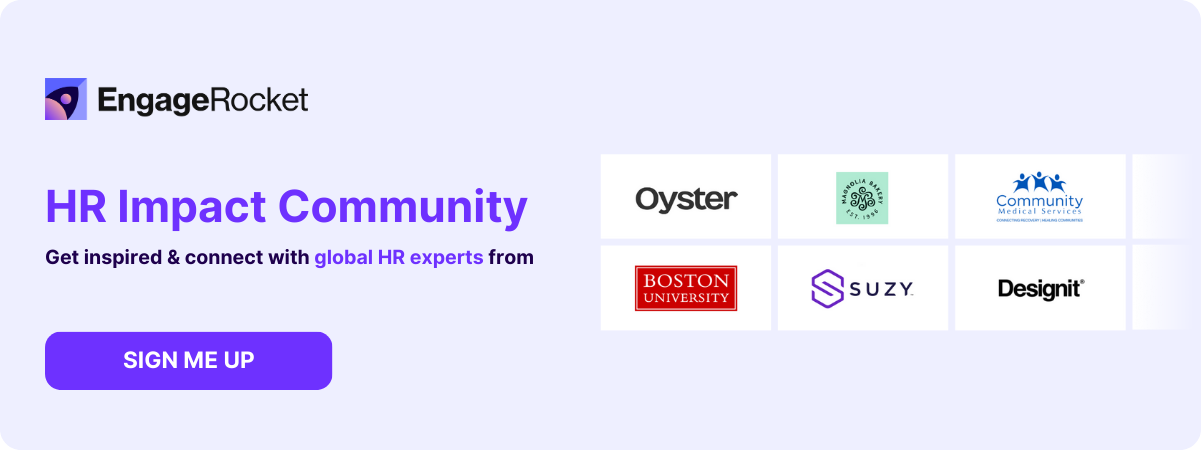

 .
. 